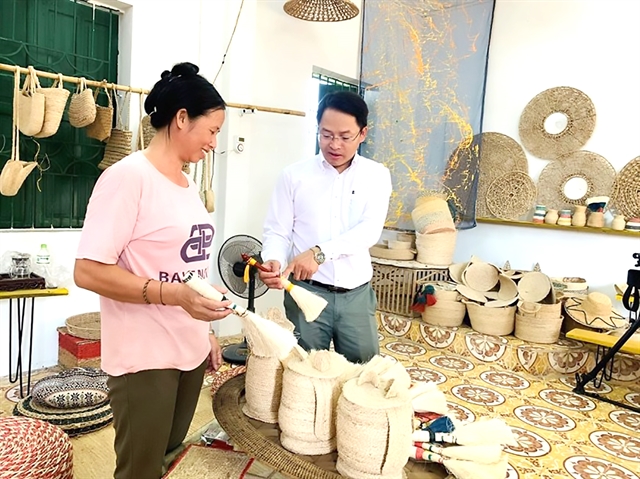 Society
Society

 |
| Bùi Khánh Dũng (right) introduces products made from banana fibres to a customer. — VNA/VNS Photo Đức Dũng |
HÀ NỘI — Bananas are easy to grow and care for, and have good yields in Việt Nam, but while most people only think of bananas as food, one man in Hà Nội is making them into handicrafts.
He is Bùi Khánh Dũng, director of the Musa Pacta Co Ltd.
His workshop is at the Khai Thái Cooperative in Khai Thái Commune, Phú Xuyên District.
“There are many banana trees in Việt Nam, but they are mainly used for food, the other parts are simply put back into the environment, which is very wasteful. I wondered how to use everything from this plant – the stem, leaves, flowers and fruits – all can create the cleanest and most beneficial products," said Dũng.
The Khai Thái Cooperative has more than ten local workers. Through their skilful hands, shiny banana fibres are created from banana tree trunks.
They plait the fibres into many handicraft products such as bags, baskets, crates, trays, carpets, lanterns, flowers, tables, chairs and sandals with unique designs.
“These products are being chosen by domestic consumers, as well as exported to many other countries in Europe, Korea and Taiwan (China),” said Dũng.
In addition to separating the banana stem into banana fibres, the juice from the banana stem is combined with ripe bananas to ferment biological enzymes into nutritious water. The water is used for vegetables and fruit trees.
The banana stem residue is composted into microbial fertiliser for plants, providing environmentally friendly micronutrients.
The company is researching other products such as vermicelli from banana roots; cotton and fabric from banana fibres.
Some calculations suggest that utilising other components of the banana tree increases its economic value by 2.5 times.
Dũng said that during his time in Japan, he saw many valuable products made from banana fibres such as paper, fabric, tea bags, and even some Japanese currency notes made from banana fibres.
Looking around the world, he said, we could see that the banana fibres market has been established and developed for several decades.
This is a vibrant, continuously growing market with the world's leading raw banana fibre exporting countries, such as the Philippines, India and China, earning billions of dollars per year.
Yet in Việt Nam, banana trees are grown everywhere, all year round, but only a few parts are taken advantage of, the banana stem is left to rot.
“After the banana stems are collected, I separate the covers and put them into the fibre press. The fibres will then be braided into large and small ropes and dyed in all colours. With much strength in raw materials, I believe that banana fibres have the potential to be a new path for banana growers, as well as to create many completely new natural materials,” said Dũng.
Musa Pacta Co Ltd, established in 2019, is the first enterprise in Việt Nam to produce and trade banana fibres and products from banana fibres.
The banana fibre processing machine was created with many difficulties, because there was no such machine on the market at that time.
With the aim of being proactive in mastering production methods, Dũng decided to invest in building the GMF Precision Mechanical Plant to make this equipment.
Thanks to its high applicability, the company's banana fibre processing machine was granted a useful solution patent by the Department of Intellectual Property under the Ministry of Science and Technology in April 2022.
At present, the company works with cooperatives in many localities with large banana growing areas to purchase banana stems at a price of VNĐ450,000 (US$18) per tonne.
It has accompanied 10 cooperatives in different provinces and cities such as Hà Nội, Nam Định, Sơn La, Lào Cai, Lai Châu and Phú Thọ in banana fibre production.
The 10 cooperatives are creating jobs for about 300-600 workers.
They take on jobs from cutting bananas, transporting, plucking fibres, pressing pulp, soaking banana stems and bananas in water to making organic biological products, handicrafts and household items from banana fibres.
The workers’ average income is VNĐ4 million ($160) per person per month.
Plaiting banana fibres is not too hard, elderly workers can also do the job.
Đào Văn Hùng, a worker at the Khai Thái Cooperative, said that he is satisfied with his current job and stable income.
"Now many other rural workers hope to work with the cooperative," he said.
Regarding his upcoming plans, Bùi Khánh Dũng said that at present the company's production scale was still small, so it had not fully exploited the raw materials’ potential and sometimes could not meet all orders.
Looking ahead, the company is investing methodically in science and technology and modern manufacturing plants.
Therefore, the Institute for Research on Organic Agriculture and High-Tech Plant Varieties under the Musa Pacta Co Ltd was founded to research and develop banana varieties with higher efficiency.
In particular, the company is investing in three plants producing fabric from banana fibres and processing banana residue as animal feed. — VNS




